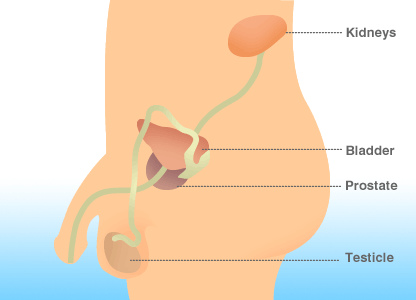Prostate cancer patients on hormone therapy ''at increased heart disease risk''
 Washington, Sept 23 : Prostate cancer patients receiving hormone therapy might be at an increased risk of developing heart problems, according to a new study.
Washington, Sept 23 : Prostate cancer patients receiving hormone therapy might be at an increased risk of developing heart problems, according to a new study.
Hormone therapy is a mainstay of treatment when the cancer is locally advanced and when it has spread to more distant parts of the body, but is increasingly being used in earlier stages of the disease. It involves either removing the testicles to eliminate the main source of testosterone production.
The researchers suggest that doctors need to start considering heart-related side effects when they prescribe endocrine therapy for prostate cancer and might want to refer patients to a cardiologist before starting treatment.
"However, not all types of therapy were associated with the risk of heart problems to the same degree," said the study''s leader, Mieke Van Hemelrijck, a cancer epidemiologist at King''s College in London.
"We found that drugs which block testosterone from binding to the prostate cells were associated with the least heart risk, while those that reduce the production of testosterone were associated with a higher risk. This may have implications for treatment choice," she added.
During the study, researchers analyzed the link in 30,642 Swedish men with locally advanced or metastatic prostate cancer who had received hormone therapy as primary treatment for their disease between 1997 and 2006.
The researchers calculated the risk of developing ischaemic heart disease, heart attacks, arrhythmia and heart failure requiring hospitalisation as well as the risk of dying from these heart diseases.
Most patients got one of the three hormone treatment choices, but 38pct got a combination of the two types of drugs.
It showed that prostate cancer patients treated with hormone therapy had a 24pct increased risk of a non-fatal heart attack, a 19pct increased risk of arrhythmia, a 31pct increased risk of ischaemic heart disease and a 26pct increased risk of heart failure.
The risk of a fatal heart attack was increased by 28pct, the risk of dying from heart disease by 21pct, the risk of heart failure death was increased by 26pct and the risk of fatal arrhythmia was increased by 5pct.
"In a more detailed analysis by type of hormone therapy, the lowest increase in risk for ischaemic heart disease, heart attack and heart failure was seen in the group taking anti-androgen therapy, and we saw no increase in risk of death from heart disease in this group," said Van Hemelrijck.
"Patients on gonadotropin releasing hormone agonist therapy had the highest risk of these problems," she added.
The study was presented at Europe''s biggest cancer congress, ECCO 15 - ESMO 34 [1], in Berlin. (ANI)